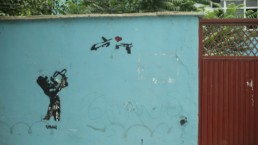‘National Bird’ Review: An Unsettling Exposé of our Government’s Role in drone warfare
Opening our eyes to the formidable truth about our Government’s role in drone warfare.
Our inclination towards human empathy is tapped into, and the result is a strong protective sentiment towards the veterans, and animosity towards the institution that broke them.
Drone warfare. Surveillance and weaponry utilized from unmanned planes controlled by members of the Air Force who remain safely behind desks on our own soil. At first thought, it can seem that in this case, technology has advanced in our favor, and the result is less warfare and fewer casualties. But, as we catch a glimpse of the people closely involved with this system and how they are affected, we begin to not only question, but grow outright disdainful for what the Government is implementing behind the curtain. In “National Bird,” director Sonia Kennebeck sets out to uncover what’s really going on with our Government and drone warfare, and the result is unsettling.
Kennebeck sets out to show us the truth about drone warfare through the storylines of three separate, and very distinctive, characters. The first one we meet is Heather: a young woman from a small town in Pennsylvania who is a former drone imagery analyst. For those of you (like me) who can’t easily identify fancy Air Force titles, her job was to watch the drone cameras and try to distinguish what she was seeing – men vs. women and children. We follow Heather as she speaks about what it was like to be behind the button during her time serving, and also how it continues to affect her. Amongst the artistically invasive cinematography and powerful sound mixing the film provides, we then meet Daniel, a Former Signals Intelligence Analyst who participates in Government protests and holds little back when explaining his opposition to drone warfare. Lisa, a Former Technical Sergeant, expresses her fear and sadness of drone surveillance systems after working closely with them as well. It is important to mention that the film was built for the theater, and only the 7.1 surround sound and 50 ft. screens can really give all of the film’s facets justice.
The three stories of the characters begin to build as they all take very different paths: Heather struggles to find acceptance and help to deal with her PTSD, Daniel faces the wrath of the US Government, and Lisa seeks understanding and forgiveness in the last place she expects to find it – Afghanistan. Through these contrasting stories, we not only get to know each veteran in an intimate way, but there is also the unique opportunity for every viewer to find a connection with at least one of the protagonists. Because of this, our inclination towards human empathy is tapped into, and the result is a strong protective sentiment towards the veterans, and animosity towards the institution that broke them.
Although the film does not offer a counter argument to the strong opinion against drone warfare, the emotional appeal of the unfolding storylines is a testament to how desperately the argument against needed to be made. It’s hard to bring up an issue that many people want to ignore, dive deep into the deficiencies of an institution, present it all without offering a solution, and still make a film people want to see. However, “National Bird” proves that this is possible. Kennebeck took on a monster of a tale to tell, and along with it came many obstacles to overcome, but the result is a deeply momentous and captivating hour and a half.
‘National Bird’ is unrated, 1 hr 32 min. Now playing at Laemmle’s Monica Film Center.
Simone Buteau
Simone is a TV/Broadcast Journalism student at Chapman University with a passion for storytelling. She is so grateful to be joining the Cinemacy team where she hopes to not only share her passion for films through reviews but also investigate the different stories that go behind every film.

